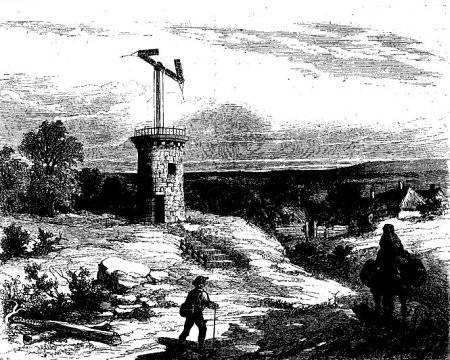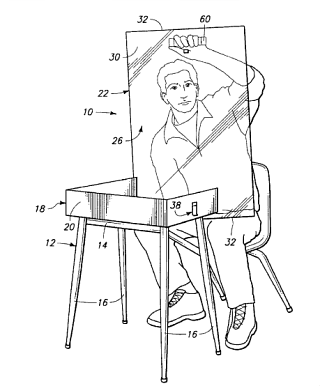pluviose
adj. rainy
madefy
v. to make wet
pluviose
adj. rainy
madefy
v. to make wet

Telecommunications got an early start in France, where inventor Claude Chappe built a series of towers between Lille and Paris in 1792. Each tower was topped with a set of movable wooden arms that could be arranged to represent symbols; if each operator viewed his neighbor through a telescope, a symbol could pass through 15 stations covering 120 miles in only 9 minutes, giving France a valuable communications advantage over the surrounding powers during the sensitive period of the revolution. It makes an appearance in The Count of Monte Cristo:
They passed to the third story; it was the telegraph room. Monte Cristo looked in turn at the two iron handles by which the machine was worked. ‘It is very interesting,’ he said, ‘but it must be very tedious for a lifetime.’
‘Yes. At first my neck was cramped with looking at it, but at the end of a year I became used to it; and then we have our hours of recreation, and our holidays.’
‘Holidays?’
‘Yes.’
‘When?’
‘When we have a fog.’
Expanded into a network of 534 stations, the system worked well, but it was expensive, with skilled operators manning towers set every 10-30 kilometers, and the messages were far from private. Finally the electrical telegraph killed it — Sweden abandoned the last commercial semaphore line in 1880. By then, depressed by illness and the conviction that others were stealing his ideas, Chappe had long since killed himself.
A groaner from Clark Kinnaird’s Encyclopedia of Puzzles and Pastimes (1946):
“A farmer had 3 3/7 haystacks in one field and 5 4/9 haystacks in another field. He put them all together. How many did he have then?”
I’ll withhold the answer.
On Sept. 13, 1862, members of the 27th Indiana Infantry were awaiting orders on a hillside near Frederick, Md., as Robert E. Lee’s Confederate troops approached from the south. One of the men noticed a package on the ground and discovered three cigars wrapped in a piece of paper. The men were rejoicing in their good fortune when a sergeant noticed writing on the paper — it was headed “Headquarters of the Army of Northern Virginia.”
They had discovered Lee’s battle plan. The orders had been issued to Gen. D.H. Hill, but one of his staff officers had apparently dropped them; Hill received a second copy from Stonewall Jackson and had not realized that the first set had been lost.
The plans passed quickly up the line, and that afternoon Union general George C. McClellan was wiring the president, “I have all the plans of the rebels, and will catch them in their own trap.” The battle of Sept. 17, Antietam, was the bloodiest single day of the Civil War. It repelled the rebel army and permitted Lincoln to issue the Emancipation Proclamation from a position of strength.
Lee later told a friend: “I went into Maryland to give battle, and could I have kept Gen. McClellan in ignorance of my position and plans a day or two longer, I would have fought and crushed him.”

Galvanized by the school shootings of the late 1990s, James R. Taylor patented a desk whose top doubles as a bullet-resistant shield:
“Another object is to provide a shield that is configured to function normally in an innocuous mode as an ordinary desk work surface but that can be easily and quickly removed from the desk for use as a personal shield against projectiles including but not limited to bullets, knives, shrapnel, or flying debris that might be encountered in naturally occurring events such as earthquakes, fires, or storms.”
I can’t tell whether any districts adopted it. Hopefully we’ll never find out.
In London some years ago a man named Pierce Bottom, weary of jokes about his name, spent several days combing through the telephone directories, seeking people who had ‘bottom’ in their names. He found dozens — Bottom, Bottomley, Winterbottom, Throttlebottom, Greenbottom, Sidebottom, Higginbottom, and so on. He arranged for a dinner to be served in the sub-basement of a London building, and sent engraved invitations to all the ‘bottoms.’ Most of them showed up, but Pierce Bottom did not, and the guests found that each of them had to pay his own check. The entree was rump roast.
— H. Allen Smith, The Compleat Practical Joker, 1953

George Burns made no movies between Honolulu in 1939 and The Sunshine Boys in 1975.
When Esquire asked why, he said, “My agent was afraid of overexposure.”
This is a story of four brothers. Billy owed a dollar to Jerry. Jerry owed a dollar to Tommy, and Tommy owed a dollar to Billy. The three of them met one day at a family picnic. Being brothers and good friends, none wished to hound the other about his debt. Vincent, the fourth brother, arrived at the picnic with some beer. While he was busily unloading the truck, Billy walked over, unnoticed, and quietly asked Vincent for a loan of a dollar, which Vincent gladly gave to him. Billy then ambled over to Jerry and paid him the dollar he owed him; then Jerry paid Tommy the dollar he owed to him; Tommy then went over to Billy and paid him the dollar he owed him. Billy then walked back to Vincent and paid him back his dollar. All old debts were paid. Simple, isn’t it?
— Raymond F. Lausmann, Fun With Figures, 1965
The one-L lama,
He’s a priest.
The two-L llama,
He’s a beast.
And I would bet
A silk pajama
There isn’t any
Three-L lllama.
When Ogden Nash published this poem, a reader pointed out that a large fire in Boston is a three-alarmer.
Nash responded, “Pooh.”

Prince Charming tells Sleeping Beauty, “I’m going to put you to sleep with this potion, and then I’ll flip a coin. Today is Sunday. If the coin lands heads, I’ll wake you again on Monday. If it lands tails, then I’ll wake you on Monday, put you to sleep again, and wake you on Tuesday. The potion induces a mild amnesia, so you won’t remember the intermediate awakening if it happens, but otherwise it won’t hurt you.”
When Sleeping Beauty awakes, what probability should she assign that the coin landed heads?
There seem to be two contradictory answers to this. From one perspective, the coin was fair, so it would seem the chance is 1/2. But from another, Beauty finds herself in one of three equally likely situations (heads/Monday, tails/Monday, and tails/Tuesday), so the chance of heads appears to be 1/3. Which is correct?